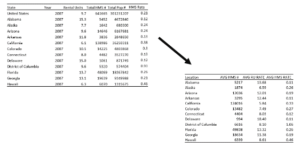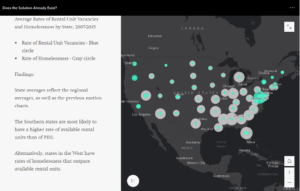What Does it Mean to be a Social Scientist in a Digital Humanities World?
By Rachel R. Underwood, Mellon Graduate Student Fellow for the Digital Humanities 2020-2021
As a sociologist in training, I’ve given a lot of consideration to my positionality within the digital humanities sphere. I first entered into DH through my joint-PhD media program (i.e. PhD in Sociology and Media) and finding my role in this space has been an exploration, to say the least. When I heard my peers discussing their exciting data corpora, like 18th-century Anglophone novels, all I could think was, “hmm.. well yesterday I pulled some statistics from the Census on rental vacancies in the Southeastern United States. That’s cool, right?” As graduate students we are all too familiar with imposter syndrome[1] – how can I ever be seen as an expert in this? I’m, just, me. And when I coupled this already overwhelming feeling with the uncharted humanities territory I was now in, questions of professional identity and contribution increased ten-fold. What can I offer to this space now and in the future?
It’s taken some time, but I’ve come to realize that the digital humanities is a bridge for professional connection, not a tool of separation. By participating in DH spaces, social scientists and humanists are given the opportunity to develop their scholarship through the shared goal of using digital technology to expand our knowledge of the human experience. It’s a pleasant reminder that even if our questions, epistemologies, and audiences are different (which, they aren’t always, too), scholars are more similar than we realize through their dedication to learning.
With that in mind, I want to share with you an example of when digital humanities and social science came together to inform a project on homelessness in the United States. I am consistently impressed by my humanist peers who are able to extract concrete data from abstract sources, such as films and texts. It takes a lot of work in data collection and cleaning to prepare this information for use in digital technologies and, in some ways, I feel like I’m cheating with the data I bring to these spaces. Many methods of data collection in the social sciences lend themselves more easily to technological manipulation, i.e., my “boring” Census data on US rental vacancies fits more tidily into a database that reads integers versus the string variables that often come from texts.
While working on this project in one of my courses I was able to use my “neat” data and previous training in statistics to contribute to our community learning environment as we waded through new technologies. Creating a data model to use in an ArcGIS program, like the one below, resembled many data compilations I’ve had to put together for statistics programs. I began to realize I had something unique to offer to this space.

Simultaneously, even though I understood the “back end,” I had little experience in crafting data for dissemination beyond tables and text. As a visual sociologist, I may be more interested in data visualizations than other scholars, however there is no denying the effectiveness of images to tell a story. From my humanist peers and tools I learned within digital humanities, I learned innovative ways to do just that – use my data on homelessness and rental housing vacancies to tell a story of housing inequality and homelessness in the United States. As you can see from the image below, a map created in the ArcGIS Story Maps program[2], a visualization of the disparity between vacant rental properties and rates of homelessness is much more compelling than it would be in text.

Expanding my professional identity as a social scientist to include digital humanities methodologies has been integral to my research. While I was spending time worrying about my place within the DH world, I wasn’t realizing the ways in which DH was becoming part of my world. I encourage any scholars interested in digital technologies and research on human expression and/or experience to not let the “humanities” in digital humanities scare you away. You belong here too.
[1] For more information on Imposter Syndrome, see this article from Psychology Today.
[2] The full project story can be viewed here.